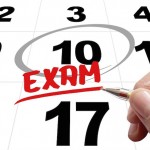Test anxiety tips

Anxiety is when you feel really nervous before a test, so nervous, in fact, that you can’t think of answers that you’re sure you know. This may happen over and over with each test that you take, so you develop the attitude that you just can’t take tests. You aren’t alone, however. Many students have test anxiety but have learned how to manage it so that they can do well on tests. Of course, a little nervousness before a test is a good thing. It helps you prepare and focus on something important that is about to happen. It tells you that you need to prepare, so you study more effectively. By studying effectively, you feel more confident and your test anxiety goes way down, which allows you to do well on the test.
What can you do, however, if you’re well prepared for the test but still have test anxiety? Well, there are a number of physical things you can do. First of all, you should get enough sleep the night before. It’s more important to go into a test well rested than to stay up late at night trying to cram for a test. If you don’t get enough sleep, your brain doesn’t work as well, and you can have trouble remembering answers that you know. Secondly, you can do some physical activity such as taking a walk outside. When you’re on your walk, notice the sounds and smells around you, the feel of the air on your face, the sidewalk under your feet, all of which will bring you into the present. When you’re totally in the present, you’re not thinking about the future test, and this will lower your stress. As a matter of fact, any form of exercise lowers anxiety because the brain releases endorphins, which make you feel good.
In addition to these actions you can take, there are a few mental techniques that you can use. The first of these is a positive thinking exercise. Just repeat to yourself, “I am prepared for this test, and I will do well.” This creates a positive attitude and increases your confidence making the test much easier to take.
Another technique is a breathing exercise. You focus your attention on your breathing while relaxing your body. Briefly, you sit up straight with your feet on the floor and your hands on your lap, and you slowly inhale through your nose feeling the breath fill you up from your toes to the top of your head. As you exhale through your mouth, you imagine all the stress of your body leaving with the breath. This exercise slows your breathing and your heart rate and therefore lowers your stress.
A third technique is a ten-second vacation. You imagine yourself in a relaxing place that makes you feel good using all your senses to mentally create this place. Again, you start by sitting with both feet on the floor and your hands on your lap. As an example, you picture yourself lying on a beach. You feel the sun on your skin and the sand under your hands. You smell the salt air and hear the waves hitting the shore. The interesting thing about this technique is that your unconscious mind cannot tell the difference between what is real and what is not. Therefore, a fantasy like this is just as relaxing as the real thing.
So far you’ve read about things you can do before a test, but there is also something you can do during a test. Don’t get upset if you have trouble answering a hard question. Understand that almost nobody gets a perfect score on a test. It’s okay to get some questions wrong. If you’re not sure your answer to the question is correct, just make your best guess and go on to the next question. Don’t even think about the last question. Get your attention on the question you now have to answer. If you got the last question wrong, so what! You can still do very well on the test.
Test anxiety is no reason to do poorly on a test if you use these exercises and techniques. Good luck on your next test!
Click on the audio recording below to hear the above lesson.
Vocabulary:
anxiety: a strong feeling of nervousness caused by fear of a possible result
attitude: belief, thought, way of thinking
manage: make less strong
focus: concentrate, put your attention
about to: ready to
effectively: in a way that produces a better result
confident: believing in your ability to do well
cram: try to learn as much as possible in a short time
physical: of the body
stress: feelings of worry and fear
endorphins: chemicals produced in the brain that make you feel good
mental: of the mind
technique: the steps you take to do something
confidence: belief in yourself
inhale: breathe in
exhale: breathe out
heart rate: the number of beats per minute
unconscious: the largest part of your mind that you are unaware of
fantasy: an unreal story or situation
during: at the same time
perfect: 100%
Pronunciation Exercise: Listen and repeat the above vocabulary on the audio file below.
© 2014 Ambien Malecot